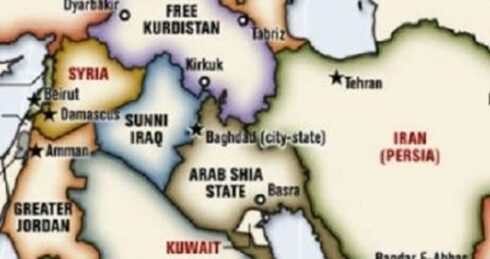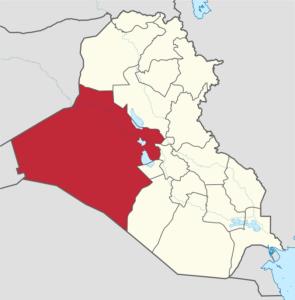Written by Damir Nazarov
In mid-July, a number of tribal leaders in the largest Sunni province of Anbar put forward demands to the government of Iraq to establish a “Sunni region.” One of the prominent figures of the separatist project, Abdul Razak al-Shammari, pointed out that “The Constitution left the right to create a region open to every Iraqi,” and they say, “the Sunni region is not a partition of Iraq.” Another face of Anbar separatism, Sheikh Raad Ali al-Suleiman, even pointed to the middle of September as the date of the conference on the “separation of Anbar” from Iraq, where the Americans and Iranians were invited to discuss the separatist project.
In contrast to the resurgent Anbar separatists, a number of well-known politicians from the Sunni environment of Iraq spoke out. Independent politician Ibrahim Al-Dulaimi pointed out that the separatists do not take into account that the Sunnis currently “do not have the ‘infrastructure’ or ‘financial resources’ to create a Sunni region.” The politician further explains that “the demand for the creation of a Sunni region is “political blackmail” and an attempt to divide Iraq.” “We will not allow the creation of a “Sunni region”,” concluded al-Dulaimi. In the same context, former MP Abdullah Al-Harbit expressed himself, who pointed out that today “there is no serious person who wants a Sunni region.” Thus, the former representative of the city of Ramadi wants to convey that the current separatists are marginalized within the Sunni community.
Representatives of the leading Sunni parties, Takaddum and Azm, did not stand aside either. The former speaker of the Iraqi parliament, Muhammad al-Halbousi (head of the Takaddum party), personally sent a message to al-Suleiman calling on him to “abandon pernicious statements that only cause confusion.” Another representative of the leading Sunni party, Yahya Al-Mohammadi, also pointed out that “Takaddum does not intend to support the creation of new regions.” A representative of another influential Sunni force, the AZM-Mahmoud Al-Qaisi Alliance, confirmed that his alliance, like other Sunni circles, opposes separatism. The leader of the Alliance party, Atil al–Nujaifi, warned against raising the issue of the Sunni region in Anbar. He also added that those who call for such a thing “have no influence on the political and popular arena.”
Representatives of the local administration of Anbar also reacted critically to the statements of the sheikhs of supporters of radical “federalization”. Javad Al-Yassari, Deputy Chairman of the Parliamentary Committee of Regions and Provinces, explained:
“The Iraqi Constitution guarantees the subject of the requirement to create regions, but the requirements that are being put forward now are aimed at separation and fragmentation. Our experience in the region is considered unsuccessful and has negatively affected the work of the central government. The issue of creating regions is currently unlikely and far-fetched.”
Further, a member of the provincial council, Adnan Al-Kubaysi, said in an interview:
“The local government of Anbar rejects all approaches taken by tribal and political figures regarding the project to create the “Anbar region”. Rumors about this issue, from time to time, are a media hype picked up by tribal figures and other political parties.”
The head of the Anbar Salvation Alliance, Sheikh Hamid Al-Hayes, saw traces of Biden in separatist activities and noted that the nominees did not even have a “single leader” to implement such a project. Speaking about the external footprint, Sheikh Abdullah Al-Jugaifi, adviser to the Security and Defense Committee of the Anbar Provincial Council, pointed out that “most of those who demand a Sunni region are outside the Sunni provinces.” The sheikh threatened the separatists:
“We will take up arms against those who harm Anbar, including those who are currently calling for regionalization.”
Finally, even the infamous Ali Hatem al-Suleiman (responsible for the events in 2013 in Anbar, after which ISIS appeared a year later), through social media, condemned the new call for separatism, pointing out that “No one thinks that Anbar will now become a region. The one who speaks about it represents himself.” These words of the former leader of the “revolutionary tribes” are important, because more than a decade ago Ali Suleiman himself was the head of local plans for “independence” from Baghdad. However, today even he is against such sentiments, realizing the absurdity of such ideas.
Conclusion. The old theme of some ambitious Anbar politicians tried to become the agenda for Iraq again, but was instantly marginalized by influential figures of the Sunni milieu. The separatists did not find the most convenient time to try to realize their ambitions, against the background of the genocide in Gaza, a number of Anbar figures exposed themselves in the eyes of Iraqis as the “Trojan horse of Zionism in Anbar.” In general, it does not matter whether the “Anbar federalists” coordinated their actions with the Zionists and their allies or not. The important thing is that for these people there is no concept of Palestine, the tragedy of the Ummah and all humanity.
MORE ON THE TOPIC:








pt asta a murit sadam? sa aoara10 state? divide et impera. sau sa le ia petrolul pe bani putini?
sa apara @
another proof of the chaotic foreign policy of the usa. they are eliminating the sunni saddam, supported by themselves, with the result of a shiite iraq! now the shiites have a contiguous territory from chahbahar to beirut.
in fact, israel should do everything in its power to hold george walker bush accountable for this!
seperatism and breaking up all the muslim countries around israel is exactly what the zionist strategy is. the yinon plan. splitting up all “enemy states” bordering israel into fractile mini-staes and impotant enclaves. so this is the worst thing to allow happen for the muslimeen. instead they should stand united against the disgraceful, disgusting zionist enemy.
so take a wild guess who is behind this destruction of ummah and country? cui bono?
putin made this statement earlier today after the assassination of hamas leader –
“russia meanwhile says killing of hamas leader ismail haniyeh threatens a full “global conflict”…
when will putin stand firmer still by saying that an attack on iran, syria and lebanon is an act of war against the russian federation?…
biggest enemy of islam is not jews or zionist or west the biggest enemy is the hypocrite muslim which mostly who called themsleve sunni and protector of mecca and medina and call shia a kuffar. today iam proud to call a shia ne ali and ahlubayt
answer:
no to this bullshit. it’s a balkanizing for america to eat the state up. little by little.
who ever wants this is a high treasurer and should be hanged high.
the irony of course being that $lumville ussa is falling apart as we speak and within a generation the 20 or 30 countries that will break away from the washing town sewer will be at each others’ scrawny throats. add to that water wars, criminal gang bosses, ethnic chaos and the $lumvillains will welcome all “aid” from the dragon and the bear as those nations will be obliged to de-nuclearize the dead beast. karma!
“divide et emperum.” who profit ? belgium has tree languages and two religions … and it’s not a problem.
can one assume that the sunnis are us friendly?
one can smell the stench of the dying anglozionazi empire of filth all over this. division, terror and war… the fruits of the maggots in the washing town sewer.